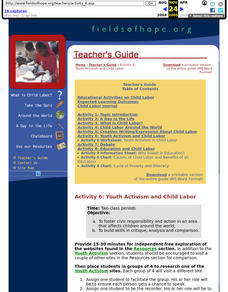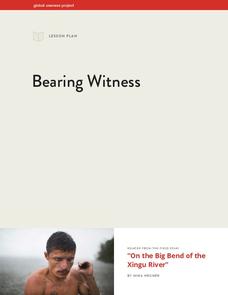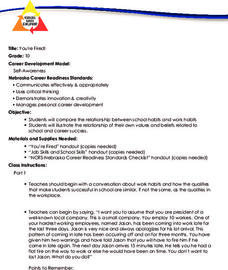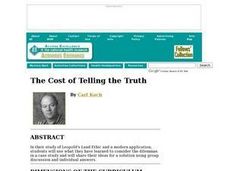Curated OER
Number the Stars Is it OK to Lie?
In this language arts worksheet, students explore the theme of truthfulness and lying in Lois Lowry's novel Number the Stars. Students answer 4 essay questions.
Curated OER
Youth Activism and Child Labor: Ethics, Work, World Cultures
Students research websites related to Youth Activism (sites are taken from a provided resource list). In different roles, students discuss, summarize and report their findings.
Curated OER
What are Hunger and Malnutrition and Who are the Hungry?: Food, Ethics, Global Cultures
Students explain the consequences of hunger and malnutrition, to know the magnitude of hunger in the world today and to know who is hungry and malnourished in the world.
Curated OER
Why are People Hungry and Malnourished?: Ethics, Food, Global Cultures, Malnutrition
Learners explain the food system that feeds people and to identify the three Pillars of Food Security.
Curated OER
What are Hunger and Malnutrition and Who Are the Hungry?: Ethics, Food, Global Cultures
Students explain the consequences of hunger and malnutrition, to know that we need many different foods and to know who is hungry and malnourished in the world.
Curated OER
Ethical Consumer Choices in the Global Village
Students identify an issue and provide several reasons to support a position. They describe ways members of a community meet one another's needs. Students explain their roles, rights, and responsibilities within the community.
Curated OER
Exploring Treaty Rights and Ethics
Students explore whether the Makah should be allowed to hunt whales. They select a side of the controversy, "Should the Makah be allowed to hunt whales again?" They research the Internet to find sources that support what they believe...
K12 Reader
Competing for Resources
Young biologists examine the concept of scarce resources with a reading comprehension passage. After finishing the paragraphs, learners turn to the questions to demonstrate what they have learned about what is beneficial and what is...
Curated OER
Introduction to the Equine Industry
You have to have good horse sense to work in the equine industry. Before considering a job working with horses, why not find out how to classify them, buy and sell them, and how they can function as an economic enterprise?
Random Acts of Kindness Foundation
Honesty and Integrity
What are the benefits of kindness and integrity? When is it difficult to be honest? Through discussion, writing, and hands-on experiences, your young learners will consider the definitions and importance of having honesty and integrity...
Thomas Jefferson Foundation
Personal Morals vs. Political Moves
Was Thomas Jefferson a hypocrite? That is the question facing class members as they examine excerpts from documents that relate to Jefferson's beliefs about slaves and slavery.
Global Oneness Project
Bearing Witness
A controversial construction project in South America, the Belo Monte dam, is endangering local cultures, ecosystems, and communities. High schoolers create a concept map based on an online article they read before engaging in discussion...
Global Oneness Project
The Consciousness of Nature
Scholars voice their opinions about animal consciousness with an article that challenges common ideas about nature. After reading the article, learners engage in a thoughtful discussion before writing out their arguments in a persuasive...
Roald Dahl
Matilda - Arithmetic
Mr. Wormwood, one of the characters in Roald Dahl's Matilda, is not the most trustworthy of characters. Have student groups take on the roles of car salespeople and play a game to see who can make the most profit by selling refurbished...
Beyond Benign
Lucky Brand Genes: Chromosome Cookies
Mutations are not just deformed creatures we see in movies—they happen every day! Scholars study the different types of genetic mutations in the 12th installment of a series of 18 lessons. A creative activity uses candy and other food...
Howard Hughes Medical Institute
Natural and Artificial Selection
Many people oppose genetically modified foods yet support selective breeding in dogs. Learn about the similarities and differences through a short presentation that features many video clips. It covers natural selection, artificial...
Agriculture in the Classroom
Farmland: GMOs and Organic Agriculture
Learn more about genetic modification, organic farming, and the role of biotechnology in agriculture by watching a documentary that shows how newly gained knowledge can be applied to specific situations involving farmers and the choices...
Biology Junction
DNA Technology
One of the first biotechnology breakthroughs occurred in 1982 with the creation of synthetic insulin. Young scientists learn about DNA technology with a presentation and accompanying worksheet. It focuses on DNA extraction and...
Cold Spring Harbor Laboratory
DNA Is Only the Beginning for Understanding the Human Genome
Mario Capecchi requested funding for a new procedure targeting genes and was rejected. Four years later, after he proved it worked, the NIH apologized and funded his research. Use an online interactive to learn about his research and the...
Cold Spring Harbor Laboratory
A Genome Is an Entire Set of Genes
Today researchers identify a gene suspected of causing a genetic disease in a matter of days rather than years, thanks to the Human Genome Project. Young scientists learn about the Human Genome Project and the scientists who designed the...
EngageNY
Grade 10 ELA Module 3: Unit 1, Lesson 10
I know exactly how you feel. That may be a statement between Henrietta Lacks and John Moore. Scholars read John Moore's story and compare his story of cell use to that of Henrietta. Learners record in a vocabulary journal, analyze...
Children’s Hospital of Philadelphia
Learning From Animals
Is all research on animals bad? Learners use a video to understand how animal research benefits humans. Pupils read about a drug modification turned deadly and the result of the 1938 Federal Food, Drug, and Cosmetic Act. Scholars use a...
Nebraska Department of Education
You're Fired!
Is willing to learn. Follows directions. Takes the initiative. The big idea in this career development lesson is that the work habits that make one successful in school are the same as those required to succeed in a career. Class members...
Curated OER
The Cost of Telling the Truth
Students examine Leopold's Land Ethic involving illegal river dumping. They consider the dilemmas of the case study and share their ideas for a solution using group discussion and individual answers.
Other popular searches
- Business Ethics
- Work Ethics
- Computer Ethics
- Medical Ethics
- Morals and Ethics
- Ecology Ethics
- Code of Ethics
- Values and Ethics
- Environmental Ethics
- Public Speaking Ethics
- Psychology Ethics
- Ethics and Science

























